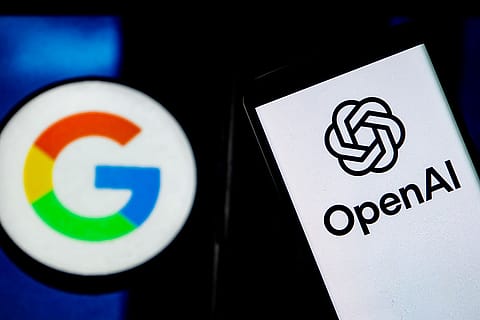ChatGPT hits 365 billion annual searches; 5.5x faster than Google
This stat shows how rapidly AI tools are scaling, with ChatGPT reaching mass utility comparable to Google Search, which at its peak held over 90% of the global search market.

ChatGPT reached 365 billion annual searches just two years after launch. In comparison, Google took 11 years to reach the same volume. This makes ChatGPT’s growth rate 5.5 times faster than Google’s, a recent AI Trends report revealed.
This stat shows how rapidly AI tools are scaling, with ChatGPT reaching mass utility comparable to Google Search, which at its peak held over 90% of the global search market. It is more than a headline; it signals to investors and policymakers the speed at which AI adoption is accelerating.
“We've never seen anything like the user growth of ChatGPT, particularly outside the U.S., and it shows how the global dynamics of tech and distribution have changed,” Meeker told news website platform Axios.
In an environment primed with smartphones, high internet penetration, and global digital fluency, AI tools like ChatGPT aren’t just growing faster—they’re compounding faster.
Investor and analyst Mary Meeker, widely known as the "Queen of the Internet," released a 340-page report on the current state of artificial intelligence on Friday. Her first trends report since 2019, the report is titled Trends: Artificial Intelligence and explores how AI is transforming global behaviour, industries, and economic structures.
The environment has changed—radically
Sceptics might argue the comparison is apples to oranges. When Google launched in 1998, global internet access was limited. Household connectivity was still emerging, and smartphones did not exist. By contrast, ChatGPT entered a world with over five billion internet users, widespread smartphone penetration, and established cloud infrastructure.
Recommended Stories
But that’s exactly the point.
Data from Morgan Stanley shows that each wave of household technology adoption in the US has occurred in nearly half the time of the previous one. The PC era took 20 years to reach 50 percent penetration. The desktop internet halved that to 12 years. The mobile internet took six. The AI era is expected to reach the same level in just three.
This acceleration is not just due to better technology. It is the result of a mature digital ecosystem that enables faster experimentation, distribution, and user onboarding at scale.
The difference in time-to-scale is less about product superiority and more about environmental acceleration. This way, the search growth comparison between ChatGPT and Google is not a comparison of OpenAI vs. Google instead, is a comparison of the ecosystem that made Google to the one fuelling ChatGPT. And it offers a baseline for how quickly foundational technologies can grow today.
(INR CR)
Why it matters
The implication is clear that product-market fit now emerges faster, scales wider, and drives user behaviour more rapidly than ever before. This presents both an opportunity and a risk. Most leading AI tools, including ChatGPT and Midjourney, use a freemium model to scale quickly. While effective for growth, this approach brings high compute costs, especially as demand for advanced capabilities rises.
Meeker points to this tension in her report. Monetisation must evolve quickly to keep up with usage and sustain the infrastructure behind large-scale AI systems. With over 800 million weekly users and training data growing at 250 percent annually, ChatGPT’s rapid ascent is setting a new baseline for the AI economy.
Meeker has a strong track record of identifying major tech shifts, including the rise of mobile, social media, and platforms like Amazon, Google, and Facebook. In her latest report, Meeker forecasts that by 2030, AI will move beyond current productivity and creative use cases to deeply personalise services across health, education, and finance. Whether it's fitness, learning, or mental health, she expects AI-based coaching tools to become widespread. She also predicts that the next billion users will not rely on traditional apps but will instead engage directly with AI agents through voice interfaces and satellite internet, bypassing the current mobile app ecosystem altogether.